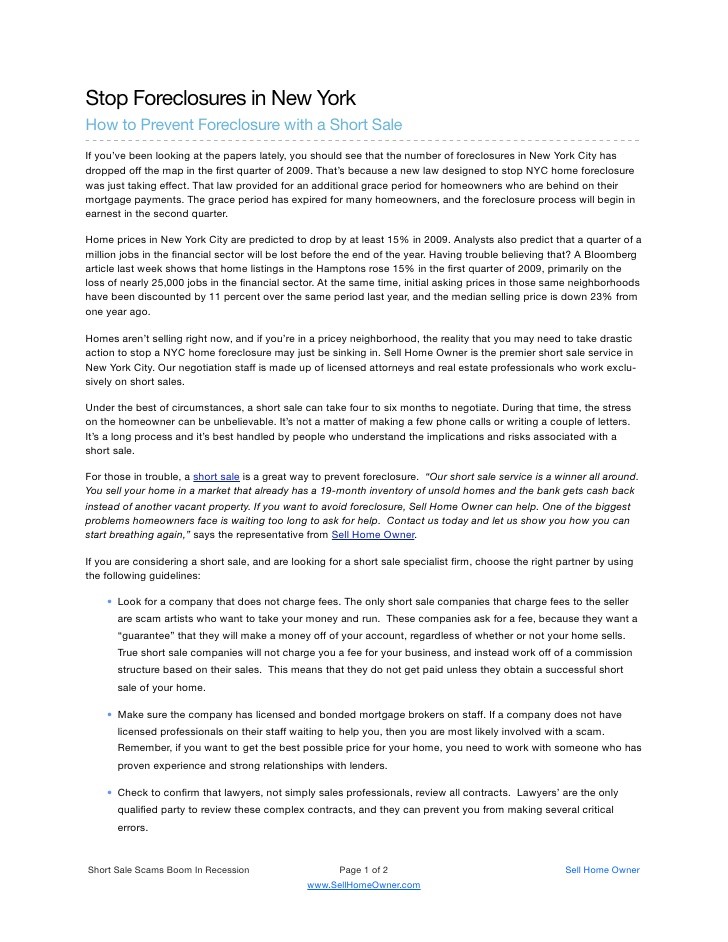Risks of Using a Short Sale to Avoid Foreclosure
Post on: 21 Май, 2015 No Comment

Talk to a Foreclosure Lawyer
A short sale is a sale of a property for an amount that is less than is owed on the loan secured by that property. Shorts sales are typically used to avoid foreclosure. Short sales have certain disadvantages—which may be legal, financial, or even emotional—for both the seller and the buyer.
Downsides of Short Sales for Sellers
Deficiency judgments. With a short sale, the lender consents to accept less than the debt owed and to release its lien on the property. While the lender may agree to release the lien, it may not agree to accept the sale price as full satisfaction of the debt. The difference between the sales price and the total indebtedness is called a deficiency. Whether or not the lender can sue the borrower to recover the deficiency will depend largely on the terms of the short sale agreement. To ensure that there will be no deficiency judgment, the borrower should negotiate with the lender to include language in the short sale agreement that the transaction is in full satisfaction of the debt.
One state, California, has a law prohibiting a deficiency judgment following the short sale of a residential property that contains not more than four units. However, most states have no such prohibition. Generally, state anti-deficiency statutes contemplate circumstances where there is an actual foreclosure sale (not a short sale) so the lender can usually subsequently obtain a deficiency judgment following a short sale so long as it is not prevented from doing so by the terms of the short sale agreement.
Taxable income. Following the short sale, the lender may opt to forgive the deficiency amount and issue a 1099-C (Cancellation of Debt) form to the seller. Generally, a forgiven deficiency amount is considered taxable income. Under the Mortgage Forgiveness Debt Relief Act of 2007, taxpayers were allowed to exclude certain discharged debt from taxable income. Unfortunately, the Act expired on December 31, 2013. However, Congress is considering a bill that would extend the Act through 2014. For more on the income tax liability for forgiven deficiency debt, see our article Income Tax Liability for Deficiencies .
Credit score. A short sale will have a negative impact on the seller’s credit score. How much of a negative impact? No one knows for sure. Some say short sales have less of a negative impact on credit scores when compared to foreclosures. However, the creators of the FICO score say the impact of a foreclosure and a short sale on a credit score is the same .
Finding a new home. Unlike other loss mitigation options, such as loan modification or forbearance, with a short sale the seller must give up possession of the property. This can take an emotional toll on the seller’s family.
Slow process. Short sales can take a long time. In most cases, the seller must submit a short sale application to the mortgage servicer, and the loss mitigation department must approve the short sale before the transaction can be completed. This process can take a while—even longer if there is more than one loan on the house. By the time the sale is approved, the buyer may have decided to walk away from the deal. Fortunately, most mortgage servicers have improved their procedures for getting short sales approved and the process no longer takes as long as it used to.
Downsides of Short Sales for Buyers

Slow process. As mentioned above, short sales can potentially take a while to complete. A short sale buyer must be willing to wait to find out if the lender will accept the offer. Moreover, the lender often rejects the first offer, especially if it is lower than the short sale listing price. Additionally, the listing price may have been set by the seller’s real estate agent (rather than by the lender) so even if the buyer offers the asking price, the lender may come back with a higher counteroffer, which can string out the process.
The good news for homeowners whose loans are backed by Fannie Mae or Freddie Mac is that there are guidelines requiring the lender to review and respond to a short sale request within 30 calendar days from receipt of a complete short sale application; provide updates on a weekly basis if the short sale application is still under review after 30 days; and make a final decision to accept or deny the short sale and notify the applicant of the decision within 60 calendar days after receipt of the complete loss mitigation package.
Lowball listing prices. Often the listing price for a short sale property will seem like a bargain that is too good to be true. Real estate agents sometimes intentionally set listing prices low to attract offers. Consequently, homes are sometimes listed well below what a lender will likely accept. The lender will then most likely come back with a notably higher counteroffer. Moreover, with a house that has a below-market asking price, there could be multiple offers from different buyers, which can lead to a bidding war between potential buyers.
Property condition. Short sale homes are usually sold as is, which means that the seller and lender will not do any repairs to the home, even if an inspection indicates issues. Additionally, the general condition of the property may be poor as sellers may not be especially motivated or financially able to provide upkeep for the property before selling.
Why Choose a Short Sale?
With all these downsides, why would anyone want to do a short sale? If both buyer and seller are able to be patient through the process and negotiate as favorable terms as possible, then a short sale can work out in the best interests of all parties. In the best case scenario, the buyer gets a great home for a very reasonable price and the seller is released from making unaffordable mortgage payments, avoids a foreclosure, and hopefully avoids a deficiency judgment as well.














